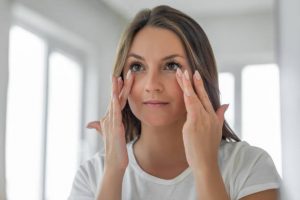
Before jumping right in, let me be clear: Everyone can benefit from taking collagen. If you think you might be a good candidate—guess what!—you probably are. Collagen is the most abundant protein in the human body, found in our tendons, ligaments, skin, muscles, bones, and blood vessels, but it decreases with age—so supplying your natural reserves is definitely a good idea.
However, there are some folks who can really see results from adding collagen supplements to their routines, stat. For the sake of simplicity, I'll stick to those curious about skin health, but let's waste no more time: Here, three types of people who should highly consider the daily ritual:

A telltale sign you should start using collagen? Fine lines, especially etchings that don't go away after pinching your skin. "Fine lines are often considered to be baby wrinkles," board-certified dermatologist Joshua Zeichner, M.D., previously told mbg. Those fainter folds can mature into deeper wrinkles later on, which is why it's essential to catch them early.
Enter, collagen peptides: Research shows these are able to support skin elasticity and dermal collagen density1. They do this by promoting the body's natural production of collagen2 and other molecules that make up the skin, like elastin and fibrillin; and these skin-critical proteins are inherent in skin's elasticity and smoothness. Studies have also shown they can even promote the skin's hydration levels—which is crucial, considering dehydrated skin can also reveal fine lines.
Technically, anyone at any age can start taking collagen (your natural production declines by an average of 1% each year2 once you hit your mid-20s, so many would consider that their starting point).
But people who experience menopause see a dramatic drop (about 30%) in collagen production during that time, which is why many start to see major skin shifts (like fine lines and sagging) during that time. So, they might be more interested in taking collagen to support their natural levels.
Skin benefits aside, taking collagen is also great for joint comfort, and according to functional medicine practitioner Bindiya Gandhi, M.D., joints naturally lose laxity as we age. It holds true for everyone, but people tend to experience it more during menopause3, according to research. Bonus points if your collagen powder also includes hyaluronic acid, as it plays a key role in helping joints feel lubricated4.
Finally, if you want firm, bouncy, hydrated skin (I'm assuming that's everyone here), then you should certainly consider taking collagen. In fact, consuming collagen is crucial for achieving "Jello skin," a concept that went viral after content creator Ava Lee (otherwise known as Glow With Ava) posted a video of herself mid-facial.
When her facialist pinches her cheek, it immediately holds its shape. "That just shows you have enough of a support cushion underneath," her facialist explains. "The way that it bounces… It's the perfect consistency of Jell-O. That's a perfect sign that you have a beautiful level of collagen in the skin."
And while you can load up on collagen-rich foods (bone broth, egg whites, etc.), you can get way more bang for your buck by using high-quality collagen supplements. Lee personally loves a collagen matcha latte in the morning, in which she swirls collagen and matcha powder together before pouring over plant-based milk. You can find a host of other easy recipes here if matcha isn't your cup of tea.
Everyone can benefit from taking collagen, but those concerned about fine lines, skin changes during menopause, or who just want to secure a plumper, more hydrated complexion should definitely invest. Just know that not every formula is created equal—you want high-quality, hydrolyzed collagen peptides at a clinically backed dose (some blends don't include enough collagen peptides to really make a difference). Good news: We have a vetted list of collagen powders right here.
Who benefits from taking a daily collagen dose ?
Individuals experiencing joint pain, seeking skin health improvement, or aiming for better hair and nail growth can benefit from daily collagen intake.
How does collagen benefit joint health, and who should consider it ?
Collagen aids in joint health by supporting cartilage integrity. Those with joint discomfort, arthritis, or athletes prone to joint stress may consider collagen supplementation.
Can collagen intake improve skin health, and who might find it beneficial ?
Collagen promotes skin elasticity and hydration. Individuals with aging skin, fine lines, or seeking improved skin texture may benefit from daily collagen doses.
Does collagen aid in hair and nail growth, and who should consider taking it ?
Collagen contributes to hair and nail health by providing essential building blocks. Those experiencing brittle nails, hair thinning, or seeking stronger hair and nails may consider daily collagen supplementation.
Are there any precautions or contraindications to daily collagen intake ?
Generally, collagen is safe for consumption. However, individuals with specific medical conditions or allergies should consult healthcare professionals before starting daily collagen doses.
